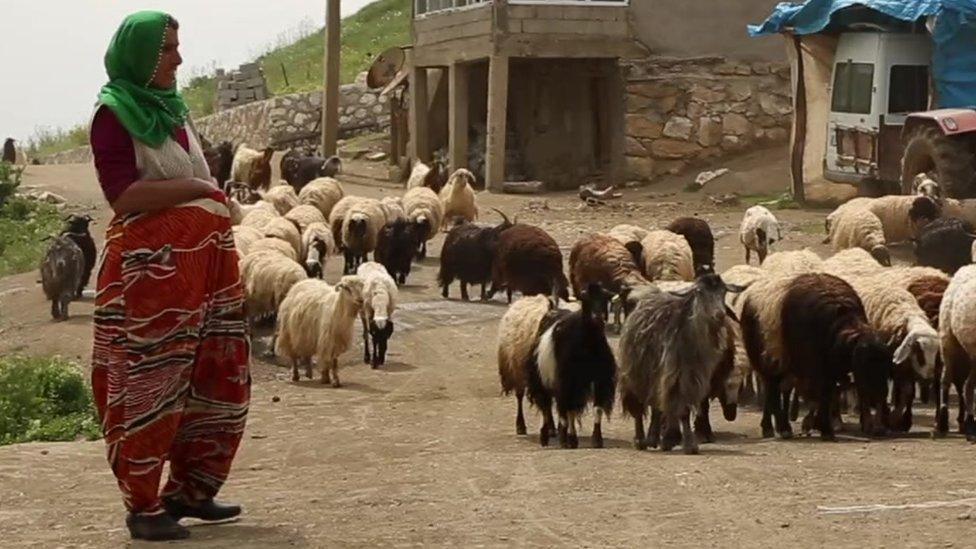Turkey election: Erdogan wins re-election as president
- Published
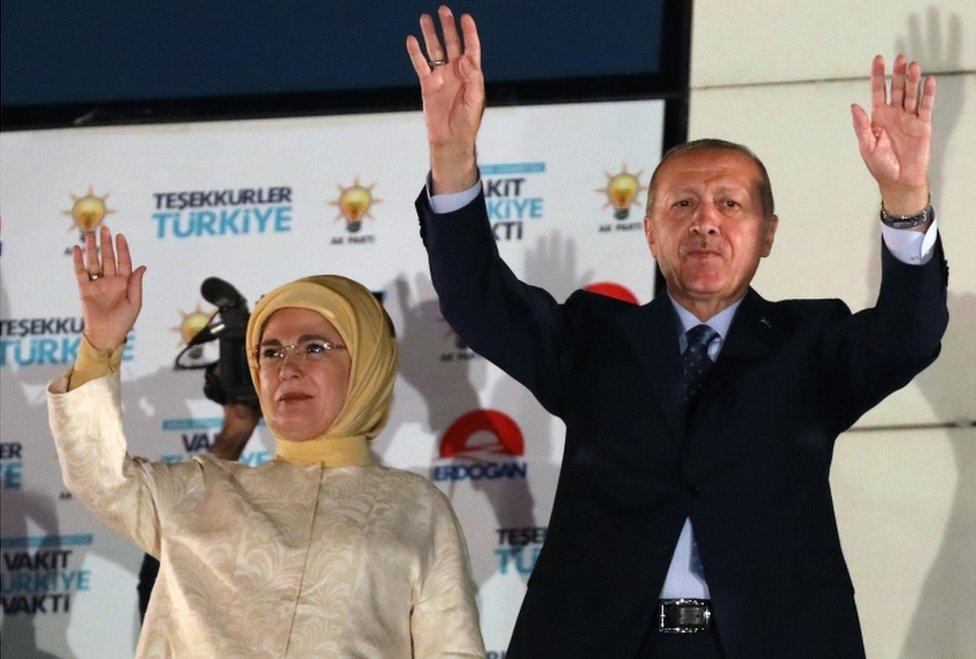
President Erdogan and his wife Emine greet supporters at his party's Ankara HQ
Turkey's long-standing leader Recep Tayyip Erdogan has won a new five-year term after securing outright victory in the first round of a presidential poll.
Mr Erdogan got nearly 53% with almost all votes counted. His closest rival Muharrem Ince was on 31%.
He will now assume sweeping new powers, won in a controversial referendum last year. The post of PM will be abolished.
Mr Ince accepted the result on the basis of poll figures - but said that everything about the vote was unfair.
Final results will be announced on Friday.
The polls were the most fiercely fought in many years.
Mr Erdogan has presided over a strong economy and built up a solid support base by investing in healthcare, education and infrastructure.
But the 64-year-old has also polarised opinion, cracking down on opponents and putting some 160,000 people in jail.
Mr Erdogan gave a triumphant victory speech from the balcony of his party's headquarters in the capital Ankara at 03:00 (00:00 GMT), declaring: "The winner of this election is each and every individual among my 81 million citizens."
Congratulations have come in from Islamic leaders including Iranian President Hassan Rouhani. Russian President Vladimir Putin talked of Mr Erdogan's "great political authority and mass support".
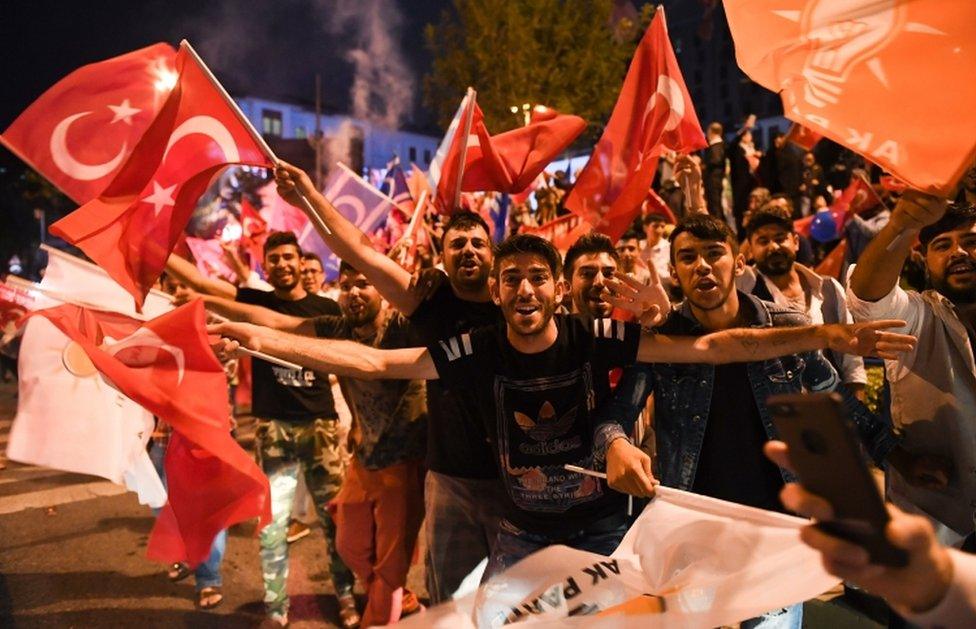
Supporters of Erdogan and the AK Party took to Istanbul's streets to celebrate
Mr Ince, from the Republican People's Party (CHP), said the election was unfair from its declaration to the announcement of the results.
Turkey was entering a dangerous period of one-man rule, he added.
But he said that there was no significant difference between official results and his party's figures, and therefore he would accept the outcome.
There were another four candidates on the presidential ballot, all of whom fell below 10% of the vote.
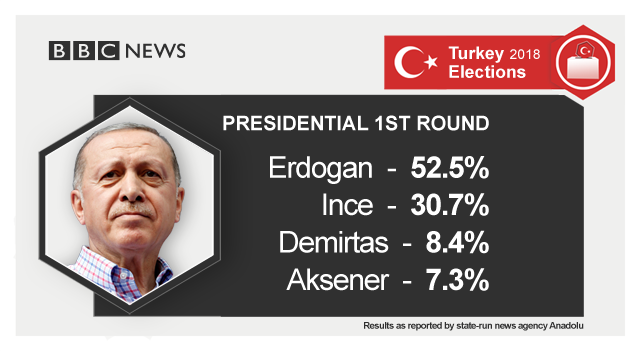
What does the result mean?
President Erdogan will assume major new powers under Turkey's new constitution. The changes were endorsed in a tight referendum last year by 51% of voters, and are due to come into force after the election.
They include:
Directly appointing top public officials, including ministers and vice-presidents
The power to intervene in the country's legal system
The power to impose a state of emergency
Some critics argue the enhanced role will place too much power in one person's hands, and that Turkey's new system lacks the checks and balances of other executive presidencies like France or the US.
Mr Erdogan maintains his increased authority will empower him to address Turkey's economic woes and defeat Kurdish rebels in the country's south-east.
In his victory speech, he said Turkey would act more firmly against terrorist groups, and would continue to "liberate Syrian lands" so refugees could return to their homes there.
Mr Erdogan was prime minister for 11 years before becoming president in 2014. Under the new constitution, he could stand for a third term when his second finishes in 2023, meaning he could potentially hold power until 2028.

'Progressive values are still here'
By Mark Lowen, BBC Turkey correspondent
Despite 90% of the media being pro-government and largely shunning the opposition, the president's posters and flags dwarfing any challenge on the streets, the election being held under a state of emergency curtailing protests, and critical journalists and academics being jailed or forced into exile, Mr Erdogan only got half of the country behind him.
"We are living through a fascist regime", the opposition MP Selin Sayek Boke told the BBC. "But fascist regimes don't usually win elections with 53%, they win with 90%. So this shows that progressive values are still here and can rise up."
For now, though, this is Mr Erdogan's time. With his sweeping new powers, scrapping the post of prime minister and able to choose ministers and most senior judges, he becomes Turkey's most powerful leader since its founding father Ataturk.
He'll now hope to lead the country at least until 2023, a hundred years since Ataturk's creation. And a dejected opposition will have to pick itself up and wonder again if, and how, he can be beaten.

Who won seats in Turkey's parliament?
Mr Erdogan said the governing alliance led by his AK Party (AKP) had secured a majority, in a separate vote for the 600-member chamber.
State news agency Anadolu said the AKP itself had 42% of the votes for parliament with 99% counted, giving it a projected 293 seats. Its partner, the MHP, had 11% and 50 seats.
The opposition CHP won only 23% (146 seats) despite Mr Ince's popularity in the presidential vote, while its nationalist ally the Iyi (Good) party won 10% (44 seats).
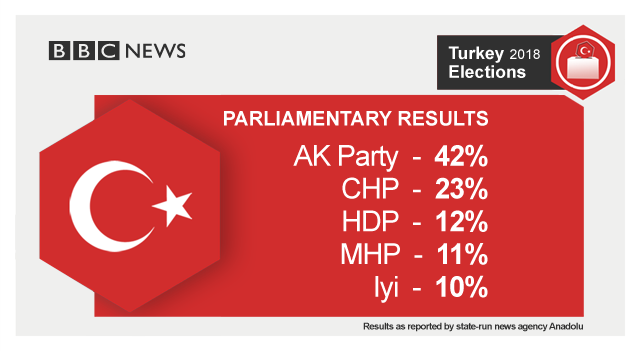
In a development that will please Kurdish voters, the pro-Kurdish HDP exceeded the 10% threshold needed to enter parliament. With 67 seats, it will form the chamber's second-largest opposition faction.
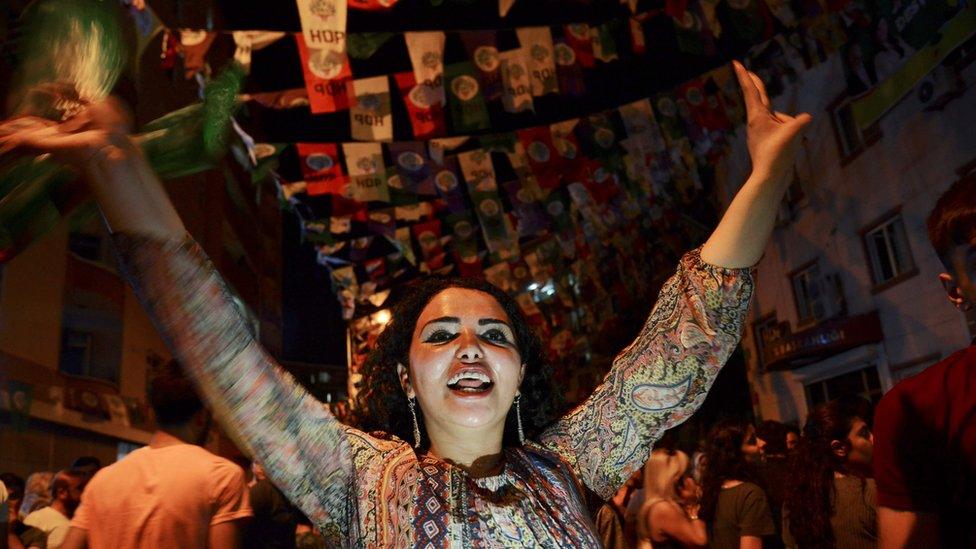
Kurds in Diyarbakir celebrated the HDP's result
The party's success comes despite the fact its presidential candidate Selahattin Demirtas is in a high-security prison on terror charges, which he firmly denies.
Was the voting free and fair?
Security was tight at polling stations. Ahead of the vote, concerns had been raised about potential voter intimidation and electoral fraud.
Voter turnout was high at almost 87%, the state broadcaster reported.
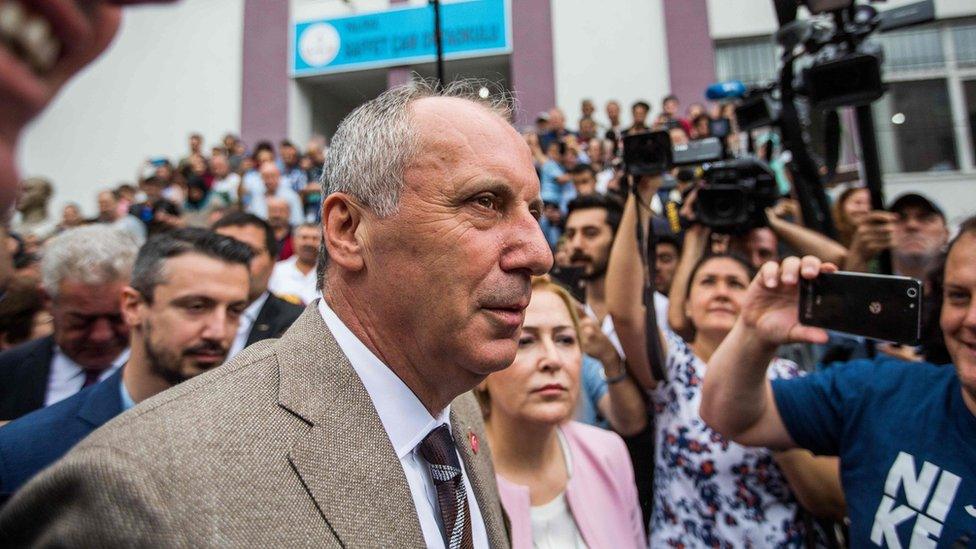
Muharrem Ince has accepted the results, though he believes the poll was unfair
Rights activists have said the press is not free to report on all sides in Turkey. It has become the world's biggest jailer of journalists under Mr Erdogan's rule, according to monitoring groups.
Mr Erdogan has already cautioned his rivals against claiming foul play, saying: "I hope nobody will try to cast a shadow on the results and harm democracy in order to hide their own failure."
What were the election issues?
The biggest was the economy. The Turkish lira has tanked and inflation stands at about 11%, though the economy has grown substantially in recent years.
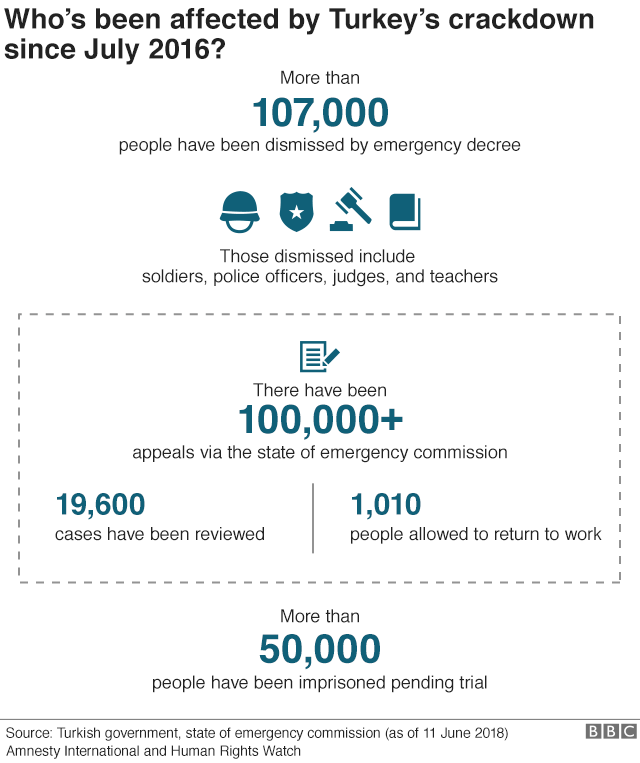

The currency has suffered as Mr Erdogan has pressed the central bank not to raise interest rates and suggested before the poll that he might restrict its independence.
Terrorism was another key issue, as Turkey faces attacks from Kurdish militants and the jihadists of the Islamic State group.
Mr Erdogan's rivals accused him of damaging civil liberties in Turkey and spearheading a slide into authoritarian rule.
Turkey has been under a state of emergency since a failed coup in July 2016, with 107,000 public servants and soldiers dismissed from their jobs. More than 50,000 people have been imprisoned pending trial since the uprising.
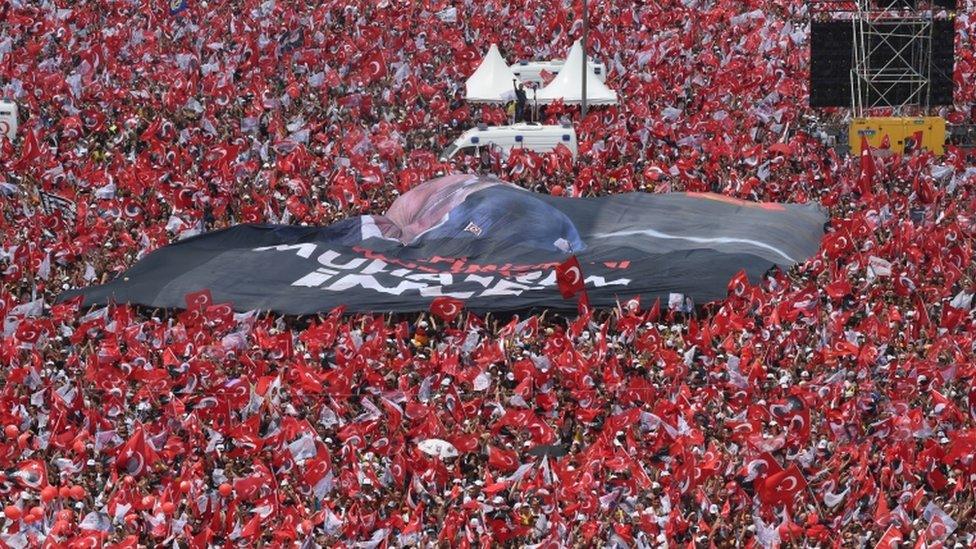
Muharrem Ince attracted huge crowds on the campaign trail
CHP candidate Mr Ince's fiery campaigning helped to revitalise Turkey's downtrodden opposition - but ultimately he lacked the numbers to end Mr Erdogan's dominance.
BBC Turkey correspondent Mark Lowen tweeted: "Yet again one half of #Turkey feels invincible, the other distraught."
Allow X content?
This article contains content provided by X. We ask for your permission before anything is loaded, as they may be using cookies and other technologies. You may want to read X’s cookie policy, external and privacy policy, external before accepting. To view this content choose ‘accept and continue’.
- Published25 June 2018

- Published18 June 2018
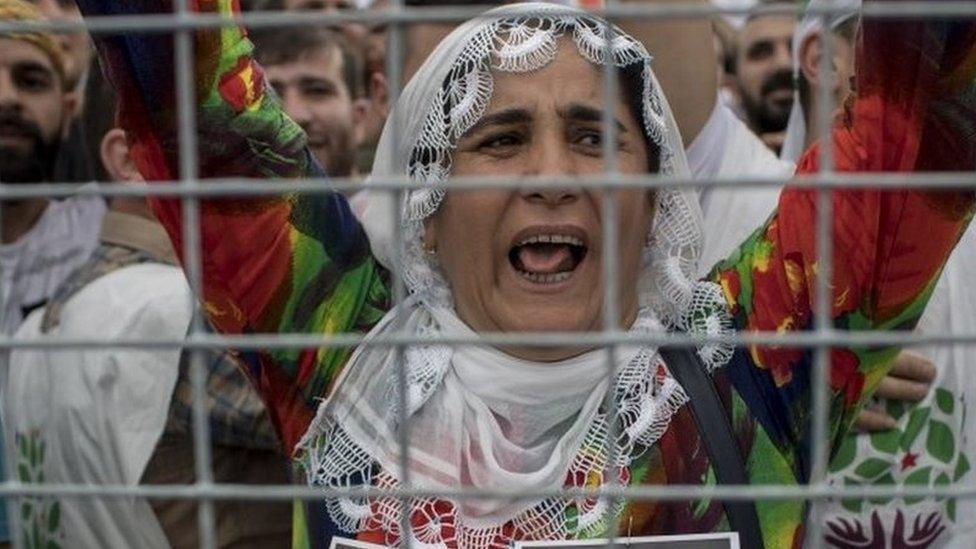
- Published15 June 2018
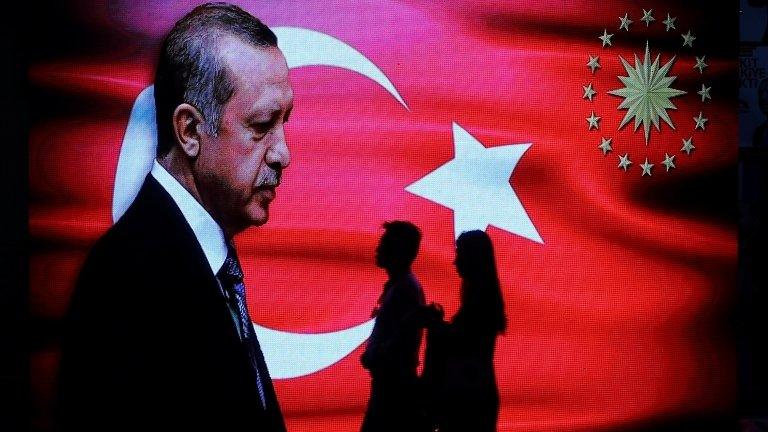
- Published21 June 2018
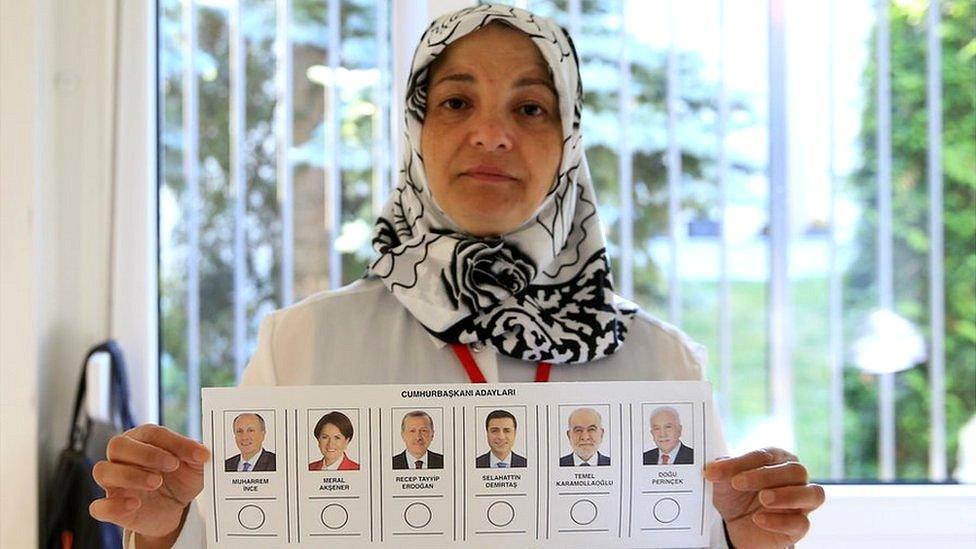
- Published8 June 2018
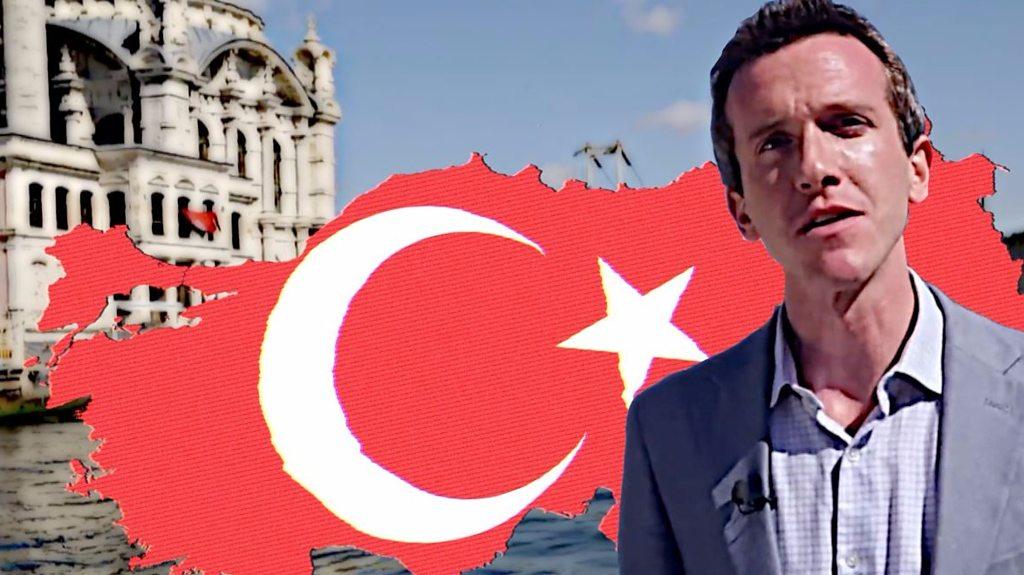
- Published22 June 2018
